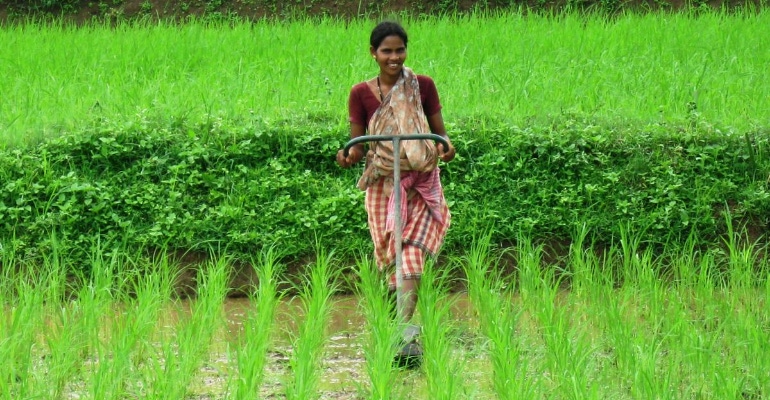Natural products industry veteran Lotus Foods is a prime example of what it means to be a mission-driven and innovative brand.

Lotus Foods is a pioneer in the rice category. The brand not only makes rice a star ingredient, it also places great emphasis on the entire supply chain—from committing to organic practices and rice farmer well-being to developing a new, sustainable system for growing the crop. With decades of experience in the natural products industry, Lotus Foods knows what it takes to succeed and have a lasting, positive impact.
Co-founder and co-CEO Caryl Levine shares why the brand has sticking power and how the Lotus Foods team is transforming the way rice is consumed.
Lotus Foods has been around for an impressive 25 years. How do you think the brand has been able to grow and thrive over decades?

A willingness to take risks and be innovative is an essential part of the equation. From the start, we had a culture that was centered around keeping the biodiversity of rice alive while improving the livelihoods of the smallholder farmers who were growing rice more sustainably. Staying agile and open led us to the System of Rice Intensification in 2005, which we branded as More Crop Per Drop, and [it] set us up to go beyond organic with an audacious goal to change how rice is grown around the world.
Lotus Foods’ success is a collective accomplishment due to the support and encouragement we received from so many people over the years: our loyal customers, investors, colleagues in the food industry, supply partners, advisors, staff, family and friends. Our gratitude is profound.
What role does innovation play in the company's growth?
CL: Innovation has been critical. We’ve been innovators from the get-go, disrupting the rice category with our pigmented heirloom black and red rice, when the only whole grain rice people were eating was brown rice. We made rice a center-of-the-plate ingredient. We were also on the front lines in committing to organic production and one of the first companies to certify rice as organic with fair trade pricing.
Then about 10 years after we started the company, we learned about the System of Rice Intensification, or what we call More Crop Per Drop, and decided that we wanted to reward farmers who were using these more sustainable practices and draw attention to the many social and environmental issues associated with conventional rice production. More recently, we saw an opportunity to match American consumers’ desire for convenience with our desire to benefit more farmers by developing value-added rice products that can be prepared quickly but are organic, nutritious and delicious. Our latest innovation is our new instant Rice Ramen soup cups that use freeze-dried technology. Instead of an envelope with dried vegetables and spices, you pour hot water over the freeze-dried soup cube and the vegetables quite literally spring to life. It makes such a difference in the taste and texture. And we’ve innovated with global [ingredients], like Kimchi, the Korean staple that is now a U.S. favorite.
Lotus Foods is committed to helping farmers yield more rice from less land and water through the More Crop Per Drop initiative. How does this work, and what impacts have you seen as a result?
CL: Most people don’t realize that growing the global rice crop consumes one-quarter to one-third of the planet’s supply of renewable fresh water. This is not sustainable, and it's leading to depletion of water sources, especially in Asia. It also contributes to global warming. Continuously flooded paddy fields produce methane, a greenhouse gas that is a lot more warming than carbon dioxide in the short term. Modern rice production also contributes to the loss of rice biodiversity and makes farmers dependent on costly seeds and inputs.
It sounds counterintuitive, but with More Crop Per Drop (MCPD) methods, farmers can double and even triple their yields using 80-90% less seed and half the water. This is because MCPD farmers are creating optimal conditions for the rice plant's growth. When fields are kept immersed under water in conventional production, it helps suppress weeds but limits oxygen to the soil and plant growth, which is why farmers compensate with synthetic fertilizer. You can see why this [MCPD] is a methodology we really wanted to get behind. It addresses so many important issues including food security, livelihood improvement, reducing water and agrochemical use and methane emissions, and [it] reduces work for women. With better yields, farmers can take some of their land out of rice and diversify their farms with high-value vegetables and fruits. One of the most exciting developments recently was that our basmati farmers in India who use MCPD methods achieved Regenerative Organic Certification (ROC)/Silver in the pilot program that evaluated the application of ROC standards.
By supporting rice grown using organic, fair trade and More Crop Per Drop practices, Lotus Foods has had a significant positive impact cumulatively, enabling the company to:
Save 4 billion gallons of fresh water—enough to give a half gallon of water to every person on the planet.
Reduce greenhouse gas emissions by 35,000 tons of CO2e (carbon dioxide equivalents), which is like taking 7,000 cars off the road for a year.
Source over 25 million pounds of organic rice.
Mission is more important than ever to consumers. How does your brand Spark Change?
CL: We want to spark change for our consumers, our producers and the planet. We want consumers to have access to food that’s good for them, is a joy to eat and is good for them because of how it was produced—on healthy soils rich in microorganisms. [We want] the families who grew the rice [to be] better off because of our relationship with them. Organic and Fair Trade premiums also make a huge difference to individual farmers and whole communities.
Finally, we want to contribute to global change in our own small way. Over three billion people depend on rice for their daily calories, and most rice is still produced on millions of small farms around the world. As a society, we need to commit to growing rice with less wasteful use of natural resources and reward farmers who are adopting more agroecological practices. COVID-19 has shown how broken our food system is. Much of the food we eat and how it’s grown is undermining our nation’s health. We need to strive towards fundamental changes in attitudes and production paradigms around food so healthy food is accessible and affordable for everyone. The natural products industry is in a strong position to play a leading role in advocating for change, both at the policy level and with the public at large.

Learn more about Lotus Foods and see its latest products in the Spark Change Product Discovery Zone virtual expo. Visitors can:
Find the latest products.
Get sales sheets and other downloadable information.
Connect with the sales team.
Head to the Product Discovery Zone.
About the Author(s)
You May Also Like




